

Grande America: France braces for oil spill damage after ship blaze. Image copyright AFP French authorities are bracing for a huge oil slick to hit the country's coastline after an Italian ship capsized near La Rochelle on Tuesday.
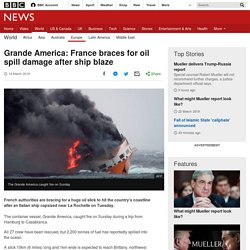
Philippines to temporarily close popular tourist island Boracay. Image copyright Reuters The Philippine island of Boracay will be closed to tourists for six months following concerns of damage to its once pristine shores.
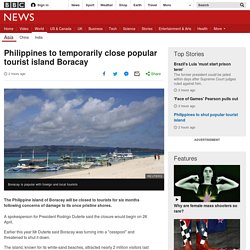
A spokesperson for President Rodrigo Duterte said the closure would begin on 26 April. Huge oil spill left after burning tanker sinks off China. Media playback is unsupported on your device Chinese ships are racing to clean up a giant oil spill after an Iranian tanker sank in the East China Sea.
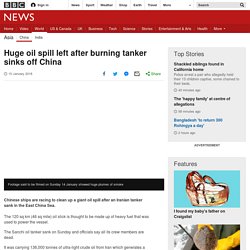
Wagamama and Pret seek to reduce plastic straw usage. Scapa Flow microplastics levels 'similar to Forth and Clyde' Davos: the inventions cutting plastic consumption. Image copyright Getty Images.
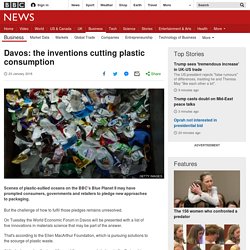
Bangladesh's water crisis: A story of gender. Kochukhali, Bangladesh - When Khadija Rahman, then a newly married 14-year-old, moved to the Satkhira district on Bangladesh's southwest coast, she didn't realise just how much the scarcity of drinking water in the region would affect her.
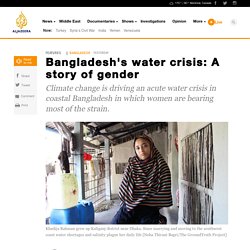
Now, 10 years later, the cheerful young woman finds that the shortage plagues her daily life. Her village, Kochukhali, lies near the Sundarbans, one of the largest mangrove forests in the world, at the edge of the Ganges delta, where water intrudes on the low-lying land and shallow ponds and rivulets proliferate across the landscape. IN PHOTOS: Surviving climate change in Bangladesh A combination of tidal flooding, inundation by storm surges and saltwater intrusion has led to a rise in salinity in the groundwater and the fresh-water ponds. Bill Gates launches chicken plan to help Africa poor. Image copyright Reuters Microsoft founder Bill Gates has launched a campaign to help extremely poor families in sub-Saharan Africa by giving them chickens.
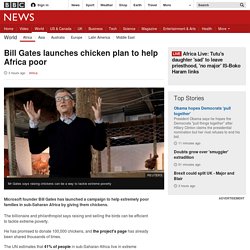
Origin of crops. 'Biodegradable' Plastics Are A Big Fat Lie. India to 'divert rivers' to tackle drought. Image copyright AP India is set to divert water from its rivers to deal with a severe drought, a senior minister has told the BBC.
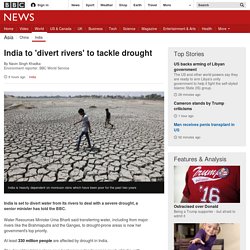
Water Resources Minister Uma Bharti said transferring water, including from major rivers like the Brahmaputra and the Ganges, to drought-prone areas is now her government's top priority. At least 330 million people are affected by drought in India. Denmark could hike tax on red meat in a bid to boost vegetarianism to help environment Urban Aquaponic Farmer and Chef Redefines Local Food in Orange County, CA – Yardfarmers.
Editor’s Note – Adam Navidi is looking at different growing methods like aquaponics in order to produce local, sustainably produced food.
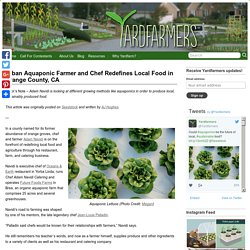
This article was originally posted on Seedstock and written by AJ Hughes. Aquaponic Lettuce (Photo Credit: Megan) In a county named for its former abundance of orange groves, chef and farmer Adam Navidi is on the forefront of redefining local food and agriculture through his restaurant, farm, and catering business. Navidi is executive chef of Oceans & Earth restaurant in Yorba Linda, runs Chef Adam Navidi Catering and operates Future Foods Farms in Brea, an organic aquaponic farm that comprises 25 acres and several greenhouses. Global food production threatens to overwhelm efforts to combat climate change. Each year our terrestrial biosphere absorbs about a quarter of all the carbon dioxide emissions that humans produce.
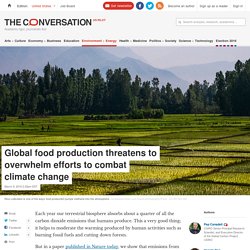
This a very good thing; it helps to moderate the warming produced by human activities such as burning fossil fuels and cutting down forests. But in a paper published in Nature today, we show that emissions from other human activities, particularly food production, are overwhelming this cooling effect. This is a worrying trend, at a time when CO₂ emissions from fossil fuels are slowing down, and is clearly not consistent with efforts to stabilise global warming well below 2℃ as agreed at the Paris climate conference. To explain why, we need to look at two other greenhouse gases: methane and nitrous oxide. The other greenhouse gases Each year, people produce about 40 billion tones of CO₂ emissions, largely from burning fossil fuels and deforestation. How Northern European waters soak up carbon dioxide. Image copyright AFP The seas around the UK and the rest of northern Europe take up a staggering 24 million tonnes of carbon each year.
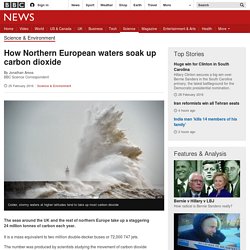
Four billion people face severe water scarcity, new research finds. At least two-thirds of the global population, over 4 billion people, live with severe water scarcity for at least one month every year, according to a major new analysis. The revelation shows water shortages, one of the most dangerous challenges the world faces, is far worse previously than thought. The new research also reveals that 500m people live in places where water consumption is double the amount replenished by rain for the entire year, leaving them extremely vulnerable as underground aquifers run down. Many of those living with fragile water resources are in India and China, but other regions highlighted are the central and western US, Australia and even the city of London. These water problems are set to worsen, according to the researchers, as population growth and increasing water use – particularly through eating meat – continues to rise.
Hoekstra also highlights the Murray-Darling basin in Australia and the midwest of the US. Boosting food crop yields 'can protect biodiversity' Increasing crop yields could help meet the rising global demand for more food while sparing land to protect biodiversity, a study has suggested. The expansion of agriculture is deemed to be one of the main drivers for global habitat and biodiversity loss. Researchers from the UK and Brazil say that boosting yields could help - but only if policies such as incentives or land-zoning are implemented as well.
Their findings have been published in the journal Science. "The least bad way we can reconcile the rising demand for food production over the next 50 years with the need to protect the environment... is through this notion of land-sparing, which is pursuing sustainable but high-yield farming on farmland," said co-author Andrew Balmford, professor of conservation science at the University of Cambridge. He told BBC News that it was probably the "least bad" option in terms of of a policy approach for food security and environmental protection - if it was possible to deliver. How the meat industry marks the land. Fishing boats become citizen science data platforms - BBC News. Fishermen in South Devon, UK, have turned their boats into "massive data platforms" for a citizen science study. They have become the first commercial fishers to gather data for the Secchi Disk Study, which is gathering data on the state of the oceans' phytoplankton.
To date, there is little scientific information on the health of the tiny marine plants that form the basis of global food chains. The data will also help fishermen manage stocks, a skipper told BBC News. Bug-killing book pages clean murky drinking water - BBC News. TOXIC: Garbage Island.